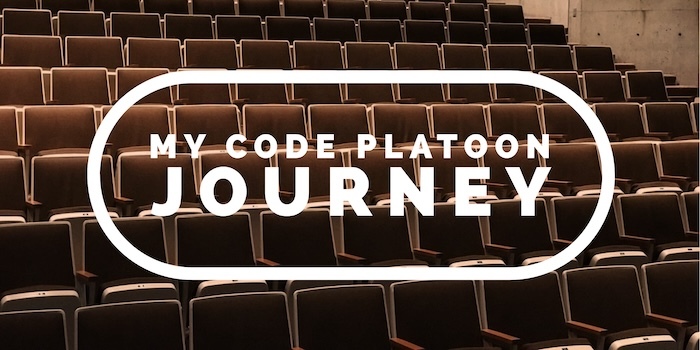From Marine to Software Engineering: My Code Platoon Journey

TLDR: Cristian Baeza, a Marine Corps Veteran, shares his Code Platoon Journey, chronicling his search for a Bootcamp, acceptance to Code Platoon, and his classroom experience throughout the immersive software engineering program.
Like many Veterans, I wasn’t sure what life after the Marine Corps would look like. I had bounced around college, switched majors four times, and was still only three semesters away from graduating when the pandemic hit. Suddenly, I had more time on my hands and with it, a decision to make about my future.
That’s when I stumbled into the world of software development.
A quick Google search turned into late nights teaching myself programming basics. What started as curiosity grew into something bigger: the realization that software engineering was both creative and limitless. I wasn’t just solving equations; I could build websites, apps, even games. For the first time since leaving the military, I felt excited about what was possible.
Discovering Code Platoon
As I researched, I learned about coding bootcamp and, more importantly, that Veterans could use programs like the GI Bill® to cover tuition. That’s when I found Code Platoon.
From my first conversation with the student outreach manager, I could tell this program was different. He explained how Code Platoon was built specifically for Veterans, Servicemembers, and military spouses. He also encouraged me to try their Intro to Coding course.
It was intense from day one, but it gave me exactly what I needed: a real taste of bootcamp life. It proved I was ready.
What struck me most wasn’t just the quality of the instruction, but the commitment. Code Platoon wasn’t here to set us up for lasting success.
Preparing for the Real Deal
After being accepted into the November Platoon, Code Platoon gave us a month-long prework package to complete before the cohort began. It wasn’t just about coding challenges (though there were plenty of those).
We got access to a private Slack channel, which meant my future classmates and I were already building a community before day one. We also met regularly with instructors, who answered questions and helped us feel prepared.
On top of that, Code Platoon gave us resources to earn certifications like AWS, huge resume boosters that other bootcamps don’t always prioritize. This combination of technical prep, networking, and professional development gave me confidence heading into the full program.
Planning My Transition
One of the toughest parts of any transition is financial planning. For me, that meant thinking ahead: saving money to cover three months of full-time bootcamp, and even considering how I might use my GI Bill®.
At the same time, I wanted to be sure software engineering was the right fit. I watched countless YouTube videos about “a day in the life of a software engineer,” and experimented with my own projects.
All of this confirmed what I hoped: this was the career path for me. And Code Platoon was the right launchpad.
Life Inside Code Platoon
Nothing could fully prepare me for the first month of the bootcamp. The instructors had warned us it would feel like drinking water from a fire hydrant, and they weren’t kidding.
We jumped right into Python and object-oriented programming. I had never touched Python before, so it was brutal. But every day felt like I was adding new tools to my developer toolbox.
By week four, we had moved on to databases and SQL. It wasn’t my favorite topic, but I understood why it mattered. That’s one thing I appreciated about Code Platoon: nothing was taught in a vacuum. Everything connected back to real-world software engineering.
The support was also incredible. With nearly 40 people in my cohort, I expected to feel lost. Instead, instructors and teaching assistants were always just a message away. Breakout rooms kept us in smaller groups, so it felt manageable and personal.
And the camaraderie? Even online, we found ways to make each other laugh, from silly Zoom backgrounds to ridiculous inside jokes (“Caturday Night Nighties,” the cat lingerie startup we dreamed up, was one of them). Those little moments kept the long, exhausting days fun.
Why Code Platoon Works for Veterans
Looking back, what stands out most about Code Platoon is how well it understands the military community. From the structured prep courses to the career support, everything is built to help us succeed.
More importantly, Code Platoon doesn’t sugarcoat the work. Software engineering is hard, and not everyone will love it. But if you’re curious, persistent, and ready to push yourself, the program will give you every tool you need.
As a Marine, I learned to adapt and overcome. Code Platoon gave me a place to apply that mindset to a new career. For the first time since leaving the service, I’m excited about what’s ahead.
Semper Fi



.jpeg?width=352&name=Whats%20Next%20(2).jpeg)

